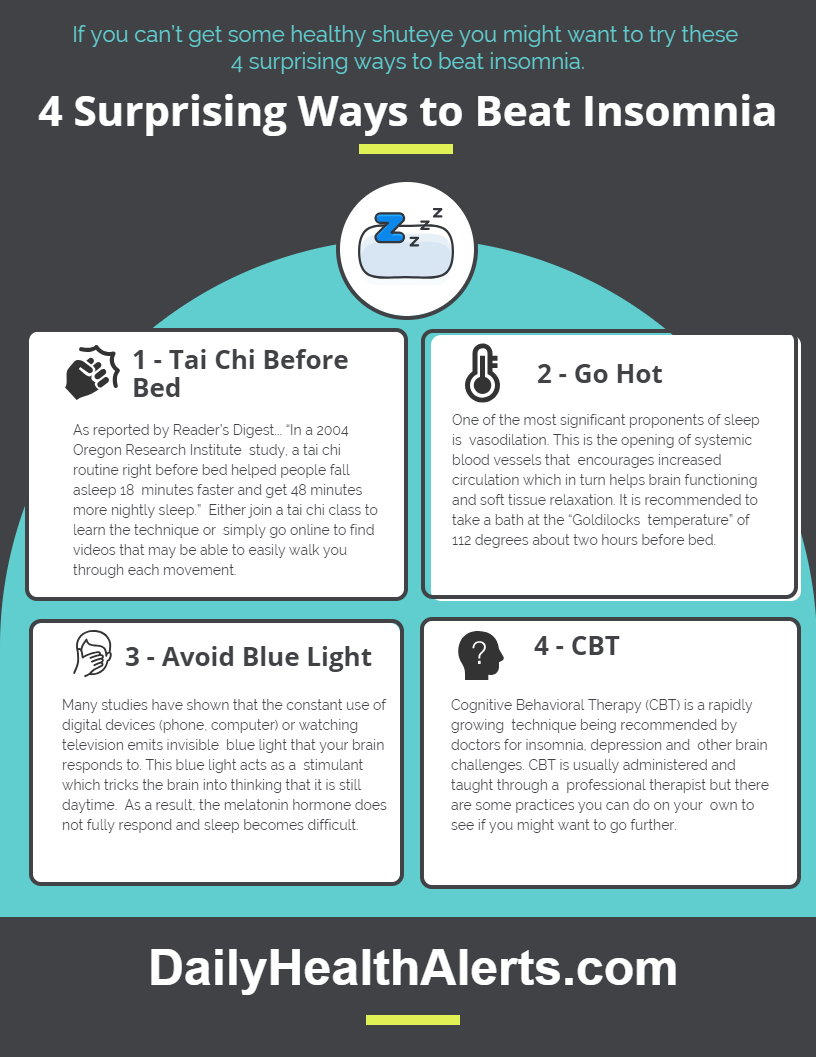If you can’t get some healthy shuteye you might want to try these 4 surprising ways to beat insomnia. These are simple fixes you may not have thought of which could have you falling into REM (rapid eye movement) before you know it. So before you grab a pharmaceutical sleeping pill that more often than not has you waking up groggy, disoriented and sluggish take the natural route first.
Tai Chi Before Bed
Tai Chi is an ancient practice that looks like slow motion martial arts. Utilizing this exercise before bed has shown some impressive results.
As reported by Reader’s Digest,
“In a 2004 Oregon Research Institute study, a tai chi routine right before bed helped people fall asleep 18 minutes faster and get 48 minutes more nightly sleep.”
Either join a tai chi class to learn the technique or simply go online to find videos that may be able to easily walk you through each movement. You’ll find this practice very meditating while strengthening balance, focus and musculoskeletal strength. This combination is excellent for inducing sleep.

Go Hot
One of the most significant proponents of sleep is vasodilation. This is the opening of systemic blood vessels that encourages increased circulation which in turn helps brain functioning and soft tissue relaxation.
It is recommended to take a bath at the “Goldilocks temperature” of 112 degrees about two hours before bed. This has been deemed the perfect temperature to induce a circadian rhythm ramp down which includes melatonin production, the essential hormone responsible for inducing sleep.
Health reports that,
“According to a 1997 study conducted by New York Hospital-Cornell Medical Center in White Plains, N.Y. When you soak in a hot tub, your temperature rises—and the rapid cool-down period immediately afterward relaxes you.”
If a hot shower or bath is not possible, soaking your feet in a hot foot bath could be just as effective. A study published in the Journal of Physiological Anthropology and Applied Human Science found that,
“These results suggest that both daily bathing and hot foot bath before sleeping facilitates earlier sleep onset. A hot foot bath is especially recommendable for the handicapped, elderly, and disabled, who are unable to enjoy regular baths easily and safely.”
Avoid Blue Light
Many studies have shown that the constant use of digital devices (phone, computer) or watching television emits invisible blue light that your brain responds to. This blue light acts as a stimulant which tricks the brain into thinking that it is still daytime. As a result, the melatonin hormone does not fully respond and sleep becomes difficult.
Newsweek reports (7/26/16) that,
“Scientists have proposed that limiting exposure to blue light given off by electronics at night could help people sleep and help reset dysfunctional biological clocks, both of which are involved in disorders like manic depression.”
When you are ready to slumber, shut down all electronics. If you need to do something in bed before you try to sleep, read something under a soft yellow light. This light should be a very low watt bulb which some recommend putting on a timer so if you do fall off while reading it will automatically turn off and you can continue dreaming in darkness.
CBT
Cognitive Behavioral Therapy (CBT) is a rapidly growing technique being recommended by doctors for insomnia, depression and other brain challenges. CBT is usually administered and taught through a professional therapist but there are some practices you can do on your own to see if you might want to go further.
These practices are done while lying in bed which include:
A study by a collaboration of Canadian researchers published in the Journal of Psychosomatic Research (3/18) found that,
“Up to 90% of individuals suffering from depression also report sleep and circadian disruptions. If these disruptions are not effectively resolved over the course of treatment, the likelihood of relapse into depression is greatly increased. Cognitive Behavioural Therapy for Insomnia (CBT-I) has shown promise in treating these sleep and circadian disturbances associated with depression, and may be effective as a stand-alone treatment for depression.”
These 4 surprising ways to beat insomnia offer a small example of ways to think outside the box when sleep is an issue. There’s no need to suffer late nights staring at the ceiling when all you may need to do is address these unique approaches to get you back into a good, healthy slumber.